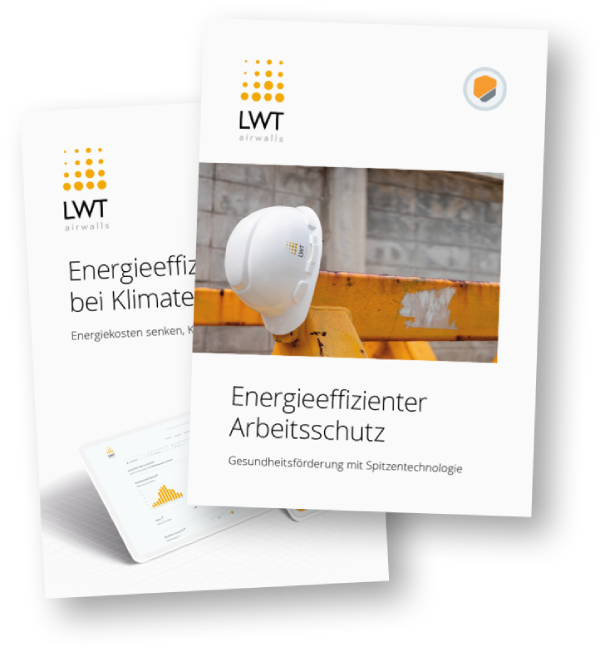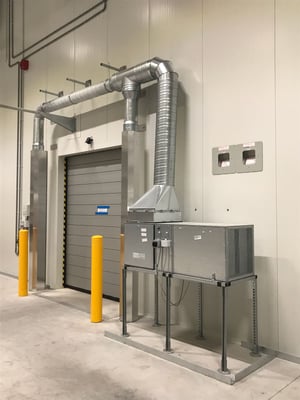
Impressive thermal insulation of industrial doors at a car manufacturer
Thermal insulation is not only important on the façade to save energy. A lot of heat is lost from industrial doors in particular.
LWT has equipped 20 industrial doors with heated air walls for a major car manufacturer. This required precise logistics in order to be able to install in the customer's three-shift operation with just-in-time delivery. Airwalls now ensure that the customer's production halls are warmer in winter and cooler in summer.
 Image of a system from the Lindner Group
Image of a system from the Lindner Group
High performance in three layers
Our customer operates one of the most modern factories in the world. The building, which is said to have cost around six billion euros, builds and delivers around 1,000 cars every day.
When there is electricity, presses, robots and conveyor belts run day and night, seven days a week, producing one of the most popular cars in consistent quality.
Lots of wind at loading ramps for trucks
The factory's logistics are designed to move large material flows and dispose of a correspondingly large amount of cardboard, packaging and waste.
Over 200 industrial doors, loading ramps for trucks and fire doors surround the main building and outbuildings. This means that trucks can dock exactly where they are needed at any time and reduce the storage space required in the factory.
Many openings to the outside do not only have advantages. Winds of up to 20 km/h often blow at the site, forcing cold air into the building in winter and warm air in summer. Because there are hardly any walls inside, large parts of the factory were exposed to difficult temperatures.
This not only disturbed our colleagues in waste disposal, assembly and the delivery of new cars, but also those in engine production.
Production also suffered, as some materials require constant, warmer temperatures.
Now this is a thing of the past in 20 places:
I am pleased that our colleagues in DU and SB have a better working situation.
Investment despite austerity measures
Our client is an employer that takes care of its employees! Extreme temperatures caused many sick days and discomfort among the workforce.
It was important that the industrial doors were reliably sealed. Air curtains were therefore out of the question.
Silencers hold the airwalls. PM 2.5 class air filters are used to protect colleagues and valuable cars.
The energy required to condition the incoming air was so high that the air walls would pay for themselves after a maximum of two years.
Cost discipline is important in order to secure the margin and finance the further expansion of production capacity. Despite the strict financial regime, LWT was asked to take remedial action.
Airwalls for thermal insulation
20 Industrial doors
LWT was commissioned to equip 20 industrial doors in several door groups with Airwalls to improve the indoor climate. One door group usually contained several loading ramps for trucks and a door for the fire department.
Many loading ramps are equipped with dual systems: a fan supplies several airwalls with air from above to ensure reliable sealing even with different ramp heights.
These multiple systems (LWT can equip up to 10 doors with them) require less electrical power when only one door is open, but still only need one ventilation system when both doors are open.
Larger logistics and fire department doors were fitted with high-performance air wall systems with side-mounted nozzles.
These are our most efficient systems because each of the precise air jets does not have to reach far. What's more, we only use EC valve motors, which require fewer rare earths.
Powerful heating
Air velocity and temperature measurements with precise anemometers at many points within the factory gave a good picture of the flow pattern. We were able to show that air velocities of 2 m/s and temperature differences of a few degrees Celcius occurred even at great distances from the gates (approx. 100 m). And this in time with the door openings.
Most of the air walls in this order therefore have powerful electric heating coils with an output of up to 100 kW, which require three-stage protection.
Controlling the air and heat output is complicated because some of the loading doors are used for waste disposal and people are constantly in the door.
All air walls are equipped with the new LWT control system based on a PLC in order to adapt the systems precisely to requirements. This means that the customer is future-proof and can retrofit a Modbus today and a control system depending on the air speed in the future.
Precise planning and logistics
The customer's production must not be disrupted. For this reason, LWT and the car manufacturer prepared each installation of a door group precisely: Many devices already fitted to the gates had to be relocated, while others, such as fire extinguishing systems, took priority and limited the available space.
The installation was also only allowed to be carried out during precisely scheduled time slots, which were often at weekends.
The logistics were planned precisely and a wide variety of trades were coordinated. LWT delivered all materials to a warehouse near the factory and was able to reliably deliver the goods and materials just-in-time.
Coordinated installation
Nevertheless, the first installations were difficult because the employees from many departments had different orders. Operations did not run smoothly either. The forklift drivers and repair teams were not yet used to the new systems.
But LWT and the customer learned quickly: in the end, the installations went extremely well:
Dear LWT-team, thank you very much for the great coordination, the constant support and the "just do it" attitude from both sides.
Nevertheless, the construction sites were safe: there were no accidents at work and the environment was not polluted!






